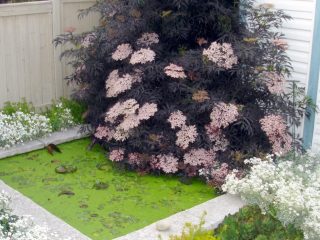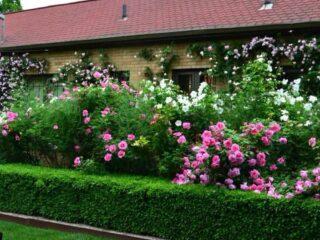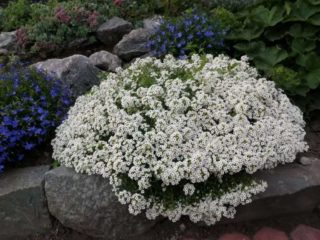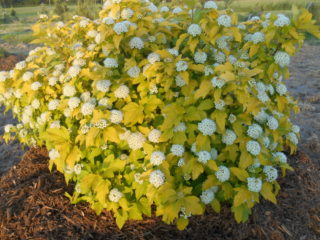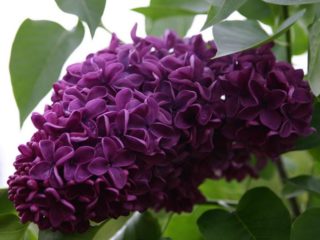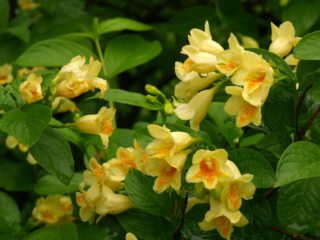Content
Quince magnificent Cameo, or Japanese chaenomeles, is a beautiful perennial shrub. It is used in landscape design, folk medicine. The fruits are edible, suitable for conservation. The plant is undemanding to growing conditions, unpretentious in care, resistant to a number of negative factors.
Breeding history
Cameo is one of the splendid chaenomeles varieties, also called excellent. The hybrid is obtained by crossing two types of quince - Japanese and fine.
The native land of the plant is East Asia. It was grown for decorative purposes, for use in folk medicine.
Description of the quince variety gorgeous cameo
The magnificent Cameo quince belongs to the genome Chaenomeles from the Pink family. It is a slow-growing deciduous shrub.
Main characteristics:
- the height of adult plants reaches 1-1.5 m;
- thick foliage;
- the crown is round, widely branched;
- branches are close-knit, prickly, thorns are rare;
- the leaves are oval, slightly wavy, the color is rich green, there is a glossy shine;
- the crown in diameter corresponds to the height of the bush;
- a large number of double flowers, collected in 2-6 pieces in shields;
- the color of the buds is salmon-peach, there is a pinkish tint;
- flower diameter 3-5 cm;
- central stamens are yellow;
- the fruits have a golden yellow color, round or ovoid, up to 5 cm in diameter, outwardly they resemble small apples;
- bisexual plant;
- life expectancy up to 16 years.
Quince magnificent Cameo is a good honey plant. During flowering, the shrub attracts butterflies. Buds appear on last year's shoots, so heavy pruning is not recommended.
Fresh fruits of the plant are tasteless, but smell good. Thanks to their healing properties, they have found application in traditional medicine. Fruits normalize material metabolism, acid-base balance, increase immunity. It is useful to use them for muscle and nervous pathologies, anemia, exhaustion.
In addition to the fruits of the magnificent Cameo quince, its leaves have useful properties. A decoction of them is able to cure seborrhea, reduce hair fragility. The leaf extract relieves inflammation, softens and moisturizes the skin.
In the photo of the Cameo quince in full bloom, you can clearly see the high decorative effect of the shrub, the abundance of large blossoming buds.
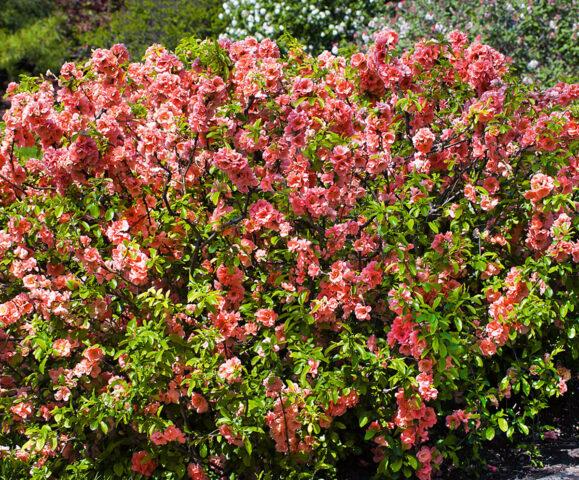
Quince Cameo is resistant to adverse factors, grows well in urban conditions
Characteristics
Quince gorgeous cameo is a bisexual plant. For a good harvest, it is recommended to plant next to two representatives of other varieties.
Drought tolerance, winter hardiness
Quince magnificent Cameo belongs to the fourth zone of frost resistance. The shrub can withstand cold temperatures down to -34 ° C. It can be grown in Moscow and the Moscow region, most other Russian regions. The drought resistance of the shrub is high. It also tolerates high humidity well, if there is no stagnation of water in the soil, high-quality drainage is organized.
Flowering period, ripening time and yield
The flowering of the magnificent Cameo quince occurs in late spring or early summer, lasts about 3-4 weeks.By this time, the leaves have not yet had time to bloom completely. Late flowers may appear in the fall. At the same time, fruiting begins. Ripening ends by the end of September or October.
At first, the fruit is greenish-yellow in color. It becomes golden after ripening, a slight blush is possible. The fruit of the Cameo quince tastes bitter, therefore they are not consumed fresh. The harvested crop can be used to make jelly, jam, compotes, marshmallows, marmalade.
Quince, a magnificent cameo, bears fruit regularly. The crop is stored for a long time, it is able to lie until spring. The fruits can be prepared as dried fruits and used for making compotes.
The yield of Cameo quince is not bad. The shrub can bear 2-5 kg of fruit. They begin to appear 5-6 years after planting.
Disease and pest resistance
Quince magnificent Cameo has good immunity. The plant is resistant to pests, various fungi.
Advantages and disadvantages of the variety
The magnificent Cameo quince attracts gardeners mainly with its high decorativeness. The edible fruit is a welcome addition.
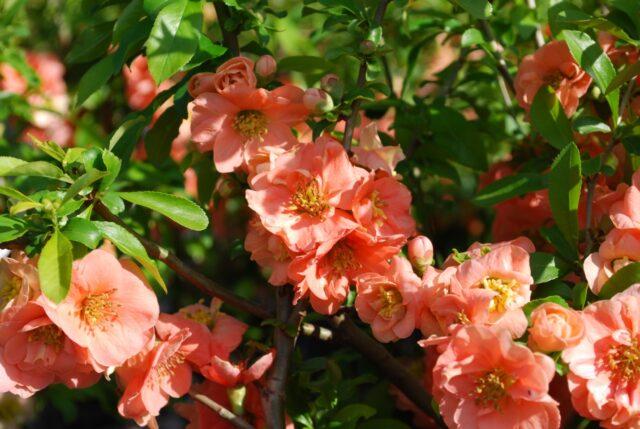
Cameo quince buds do not bloom at the same time, because the flowering stretches up to a month
Pros:
- high decorativeness;
- self-fertility;
- abundant flowering;
- resistance to frost, drought;
- unpretentiousness to growing conditions;
- undemanding care;
- regular fruiting;
- good immunity to fungal diseases;
- resistance to pests.
The variety has no disadvantages.
Features of planting and care
Japanese Cameo quince is undemanding, therefore it is not difficult to grow it. The shrub will respond to the right place for planting and competent care with abundant flowering and a good harvest.
Landing dates
You can plant a magnificent Cameo quince from July to October. Until then, it is recommended to store seedlings at 0-2 ° C. Another option is spring planting. The soil should warm up to 8-10 ° C.
Planting dates should be oriented towards the climate in the region. Work is best done a few weeks before the cold snap. This will give the seedlings time to take root so that they can endure the winter.
Landing requirements
Quince gorgeous Cameo prefers sunny areas, although it tolerates light shade. Protection from the north wind is mandatory. The shrub grows well on light and acidic soils saturated with humus.
Landing algorithm
The site for the Cameo quince needs to be prepared in advance, preferably in the fall. It is necessary to dig up the ground, remove weeds and plant debris.
Landing Algorithm:
- Prepare a pit with a side of 0.5 m, depth up to 0.8 m.
- Add 1.5 buckets of humus, 0.5 kg of ash, 0.3 kg of superphosphate and 30 g of potassium nitrate to the excavated earth.
- Pour a hill of the resulting soil mixture into the depression.
- Place the seedling in the hole. The root collar should be flush with the surface.
- Cover the depression with soil and compact.
- Water abundantly.
- Shorten the shoots, leaving 0.2 m.
Quince transplants do not tolerate well, therefore it is important to immediately place it in a permanent place. This feature is associated with a long taproot, which is easy to damage.
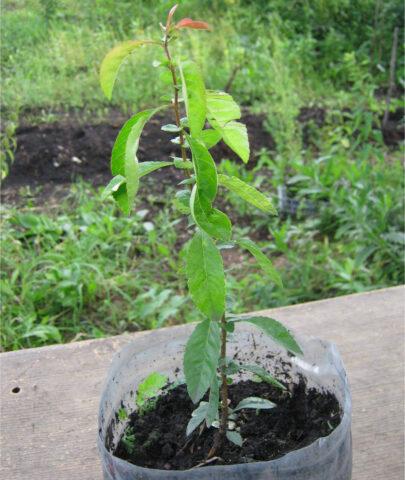
Seedlings should be placed at intervals of 1 m - dense planting increases the risk of disease
Follow-up care
Due to the resistance of the excellent Cameo quince to cold, drought and high humidity, it is easy to care for it. Main steps:
- Water young plants regularly, last time in August. Waterlogging is bad for the taste of the fruit. Enough watering every month.
- Top dressing 2-3 times a year. In spring, nitrogen compounds, in summer and autumn, a combination of potassium and phosphorus in liquid form.
- Annual pruning. Carry out after flowering. Remove crooked, old, diseased shoots, thin out the crown.
- Regular loosening and weeding.
- Mulching the trunk circle.You can use tree bark, sawdust, peat. A layer of 5 cm is enough.
When fertilizing the planting pit, the first year of feeding is not needed. If the number of fruits is not important, you can do without additional fertilizing in the future.
If the climate in the region is warm, you can form a tree with 3-6 trunks. He will have a common crown. Formative pruning is carried out no earlier than five years. For good flowering and fruiting, it is recommended to leave 10-15 branches of different ages.
The Cameo quince does not require special insulation if it will be covered with snow in winter. Otherwise, there is a risk of frostbite. For insulation, you can use spruce branches and a shield shelter. Young seedlings should be protected with agrofibre, cardboard box or box.
Quince Cameo has good immunity to fungal diseases, but they can be provoked by stagnant moisture, heavy rainfall. Preventive treatments will help prevent infection. Bordeaux liquid, Horus preparations, Abiga Peak are effective.
For the prevention of pests, it is worth using acaricides. Before bud break, you can apply Aktara, Actellik, Karbofos.
Application in landscape design
Quince gorgeous Cameo looks good both in single and in group plantings. It can be used to create fringes, low but dense hedges. It will perform a protective and decorative function.
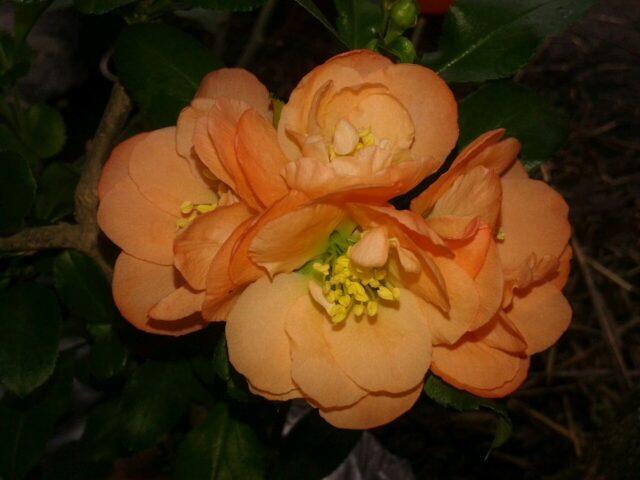
The hedge of Cameo quince turns out to be asymmetrical, but the beautiful flowering repeatedly compensates for this shortcoming
In a single planting, Cameo quince will look good on the lawn, lawn. It can be placed in the patio, small garden. The variety is great for creating decorative compositions. It can be combined with perennial flowers and other shrubs:
- barberry;
- hawthorn;
- weigela;
- heather;
- honeysuckle;
- mahonia;
- golden currant (golden);
- spirea;
- forsythia.
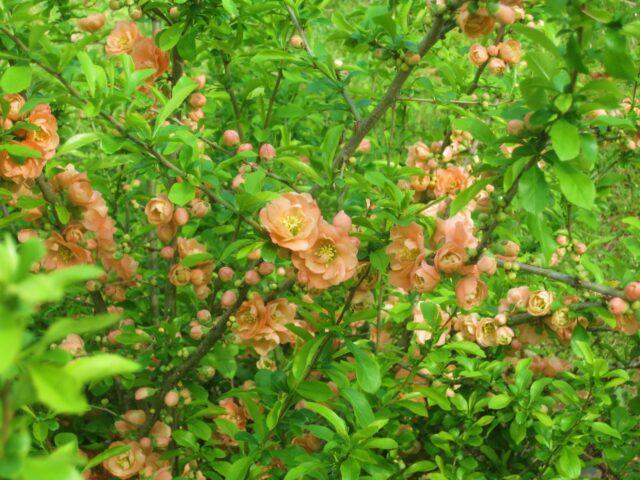
Even a faded Cameo quince will be beautiful due to the abundance and brightness of greenery.
Japanese quince is a great option for creating an oriental-style garden. The shrub looks good on rocky slopes, alpine hills.
Conclusion
Quince magnificent Cameo attracts with high decorativeness, healing properties and the possibility of processing fruits - canning, cooking delicacies. The shrub is undemanding to care, but does not tolerate transplanting well. The plant looks good in a group planting and alone.
https://youtu.be/NaadVWEJmWs
